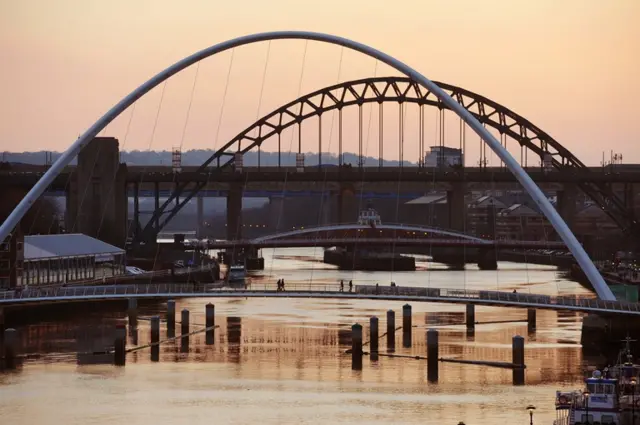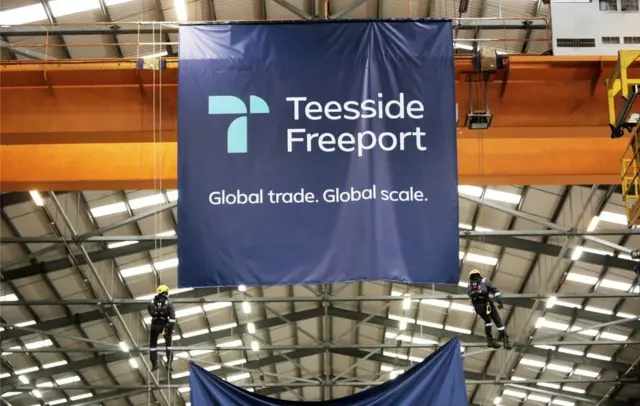Live Reporting
'No definite time frame' for Wilson returnpublished at 11:55 GMT 3 February 2022
Driver killed and teenagers hurt in crash with truckpublished at 11:27 GMT 3 February 2022
11:27 GMT 3 February 2022A man in his 20s is killed and two passengers aged 18 and 19 suffer life-threatening injuries.
Read More'She was given 12 months to live' - Hartlepool boss Lee on wife's brain tumourpublished at 11:24 GMT 3 February 2022
11:24 GMT 3 February 2022As Hartlepool United prepare to face Premier League Crystal Palace in the FA Cup, boss Graeme Lee talks about his "warrior" wife who was diagnosed with a brain tumour and given 12 months to live.
Read MoreGuimaraes in action for Brazilpublished at 08:15 GMT 3 February 2022
08:15 GMT 3 February 2022Transfer news: Bayern's Muller linked with Everton & Newcastlepublished at 07:27 GMT 3 February 2022
07:27 GMT 3 February 2022Garden village plan deemed 'sound in principle'published at 07:14 GMT 3 February 2022
07:14 GMT 3 February 2022A council earmarks land for 4,000 homes but opponents say it would lose "precious" green space.
Read MoreHope and doubt in the towns in need of levelling uppublished at 17:46 GMT 2 February 2022
17:46 GMT 2 February 2022What do people in areas identified as being in need of "levelling up" really think of the plans?
Read MoreWho is your favourite PFA Player of the Year?published at 17:25 GMT 2 February 2022
17:25 GMT 2 February 2022How sustainable is your club?published at 16:20 GMT 2 February 2022
16:20 GMT 2 February 2022Car-flip accused farmer: 'My home is my castle’published at 16:09 GMT 2 February 2022
16:09 GMT 2 February 2022Robert Hooper tells a jury he felt threatened when he asked two men to move a car from his drive.
Read MoreFarmer accused of flipping car over in roadpublished at 16:08 GMT 2 February 2022
16:08 GMT 2 February 2022Robert Hooper denies dangerous driving and criminal damage after the incident on his farm driveway.
Read MoreRow over whether snow centre £250k needs repayingpublished at 13:52 GMT 2 February 2022
13:52 GMT 2 February 2022The snow centre project collapsed after Middlesbrough's mayor withdrew support in 2020.
Read MoreLevelling up: 'A great slogan but how to do it'published at 13:33 GMT 2 February 2022
13:33 GMT 2 February 2022Michael Wild
Political programmes editor, North East & CumbriaIt’s been called the central mission of Boris Johnson’s premiership. A whole government department was renamed in its honour.
While the phrase “levelling-up” quickly replaced Northern Powerhouse and Big Society on the lips of every would-be Conservative.
It’s a great slogan.
But exactly what it means to level up the UK - and how success will be measured - has always been more elusive.
The problem is clear. The North East lags well behind other parts of the country.
Men and women die on average three years earlier than in the South East. Children are more likely to be obese and do less well at school. Unemployment is higher, wages lower
And government spending on areas like transport falls woefully short of what’s available to London and the South.
Narrowing those divides is surely a priority for any government which wants to see a healthier, fairer and more economically-balanced country.

But how to do it?
Well so far there have been assorted pots of money – the High Street Fund, the Levelling Up Fund, the Shared Prosperity Fund – with councils often invited to bid against each other for a slice of the cash.
Teesside has secured a Freeport and Darlington a new northern headquarters for the Treasury.
Yet at the same time local councils have faced a continued budget squeeze.
Critics say none of the government’s plans amount to a coherent strategy to tackle the region’s fundamental health and economic problems.
Today’s White Paper is an opportunity to make that case – but there’s little or no new money and some of the targets remain pretty vague.
The government acknowledges it can only do so much. That why it wants more devolution deals – moving power and money from Whitehall to local mayors like Ben Houchen in the Tees Valley.
There’ll be an expanded deal for the North East while Durham will go it alone with its own devolution revolution.
This might all be a welcome start – but it’ll take billions of pounds of spending and years of political commitment before areas like the North East are genuinely levelled up.

What will levelling up mean for North East?published at 13:01 GMT 2 February 2022
13:01 GMT 2 February 2022BBC North East political editor Richard Moss asks what levelling up means for the region.
Read MoreTransfer news: Magpies bid for Ruiz turned downpublished at 07:30 GMT 2 February 2022
07:30 GMT 2 February 2022Power restored to homes four days after stormspublished at 07:10 GMT 2 February 2022
07:10 GMT 2 February 2022Northern Powergrid says more than 97,000 homes lost power because of Storms Malik and Corrie.
Read MoreHow green are Premier League clubs?published at 06:33 GMT 2 February 2022
06:33 GMT 2 February 2022Tottenham and Liverpool are the joint-greenest clubs in the Premier League after the 2021 edition of The Green League.
Read More'I beat online trolls and got elected to council'published at 06:03 GMT 2 February 2022
06:03 GMT 2 February 2022Samantha Townsend says one person told her she should be dragged out into the street and shot.
Read MorePolice and councils failing on grooming - reportpublished at 17:58 GMT 1 February 2022
17:58 GMT 1 February 2022Data such as ethnicity, which would help identify abusers, is not collected, an inquiry finds.
Read MoreHorse-punch man fined for football match violencepublished at 17:47 GMT 1 February 2022
17:47 GMT 1 February 2022Two men are sentenced for violent behaviour at football matches in Bristol.
Read More